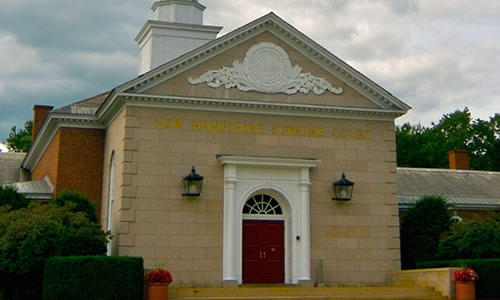By GARRY RAYNO, InDepthNH.org
CONCORD — The state Supreme Court on Wednesday granted the state’s and Coalition Communities 2.0’s motions to stop implementation of Superior Court Judge David Ruoff’s ruling declaring the state’s administering of the Statewide Education Property Tax unconstitutional.
The stay prevents the Department of Revenue Administration allowing property wealthy communities to retain the excess money they collected under the statewide property tax and prohibits the agency from setting negative local education property tax rates for unincorporated places with no or few students.
The court’s decision to stay implementation did not include Chief Justice Gordon MacDonald or Associate Justice Patrick Donovan, who the plaintiffs asked to be recused due to potential conflicts for past association’s with either the plaintiffs’ attorneys or education funding cases.
The Rand (and other commercial and residential property taxpayers) versus the State case, along with the ConVal and other school districts versus the State decisions have been appealed to the Supreme Court.
The other three Supreme Court justices, James Bassett, Anna Barbara Hantz Marconi and Melissa Beth Countway ruled unanimously on the stay motion. The three judges also ruled earlier in the month to grant the state’s motion to stay implementing the ConVal decision.
The three justices declined to rule on Ruoff’s Feb. 20 order to grant the Rand plaintiffs’ motion to treat the trial court’s orders as a final decision on the merits of the plaintiffs’ SWEPT claims.
The court also accepted the Coalition Communities’ appeal of the superior court’s order on the SWEPT issue in Rand and also the State’s co-appeal.
The Coalition Communities 2.0 comprises about 25 property wealthy towns and small unincorporated places. The about 50 property wealthy communities have retained about $29 million annually that under the ruling would have to be sent to the state.
The group filed an appeal of Judge David Ruoff’s decision calling the administration of the statewide property tax unconstitutional because it results in differing tax rates for the communities March 5 and the request to put off implementing the court’s decision March 6.
Ruoff had earlier rejected the group’s and state’s motions to stay his decision and reconsider his ruling.
In their motion to stay, the Coalition Communities claim the ruling would be disruptive to the towns and cities impacted, put millions of dollars at issue and upset the status quo which has been in place for more than a decade.
But the plaintiffs contend the Coalition Communities lost their standing in the case when the decision was released as every municipality in the state would have proportional and reasonable taxation as the constitution requires after the ruling.
The current system allows taxpayers in different communities to pay more than others to cover the state’s obligation to fund an adequate education.
The plaintiff’s argue the Supreme Court had already determined that was unconstitutional in the Claremont education funding lawsuit.
The Supreme Court’s decision to stay the proceedings also requires the Coalition Communities and the State to pay for transcripts of superior court proceedings in the case.
The Rand attorneys sought MacDonald’s recusal because he was the Attorney General when the ConVal challenge to the state’s funding of an adequate education was heard and was likely to be involved in choosing the attorneys to present the state’s case and involved in the legal strategy.
Several aspects of the Rand and ConVal cases overlap the plaintiffs’ claim including the adequacy of differentiated aid in the education formula, that have yet to be decided by the Superior Court.
The recusal request also notes that attorney Andru Volinsky was an Executive Councilor when Gov. Chris Sununu nominated MacDonald to be chief justice and was one of three votes against his nomination, which became controversial.
The attorneys sought Donovan’s recusal because as an assistant attorney general he represented the state during the trial and the appeal of the Claremont education funding case and represented the state in trying to extend the deadlines set by the court in the Claremont II decision.
Both the ConVal and Rand cases are closely linked to the original Claremont decisions, the plaintiffs note.
Both the ConVal and Rand cases have been appealed to the Supreme Court and in both cases the court has granted motions to stay implementing the decisions.
The House is currently reviewing House Bill 1583 which would increase state education aid by about $100 million next fiscal year, and a proposed amendment that would bring state aid in line with Ruoff’s recommendation in the ConVal suit of $7,356 per pupil and raise the additional money through “re-characterizing” local school property taxes as state taxes under the Statewide Education Property Tax, implementing the Rand decision to have wealthy communities send excess money to the state, and implementing three-year school budget freeze for all districts with an allowable increase tied to a three-year average of the Consumer Price Index. Otherwise a two-thirds majority of local school district’s legislative bodies would be needed at school district meetings to obtain a larger increase.
The House is expected to vote on the bill next month.
Garry Rayno may be reached at garry.rayno@yahoo.com. Garry Rayno is InDepthNH.org’s State House bureau chief with 40 years of reporting experience.





